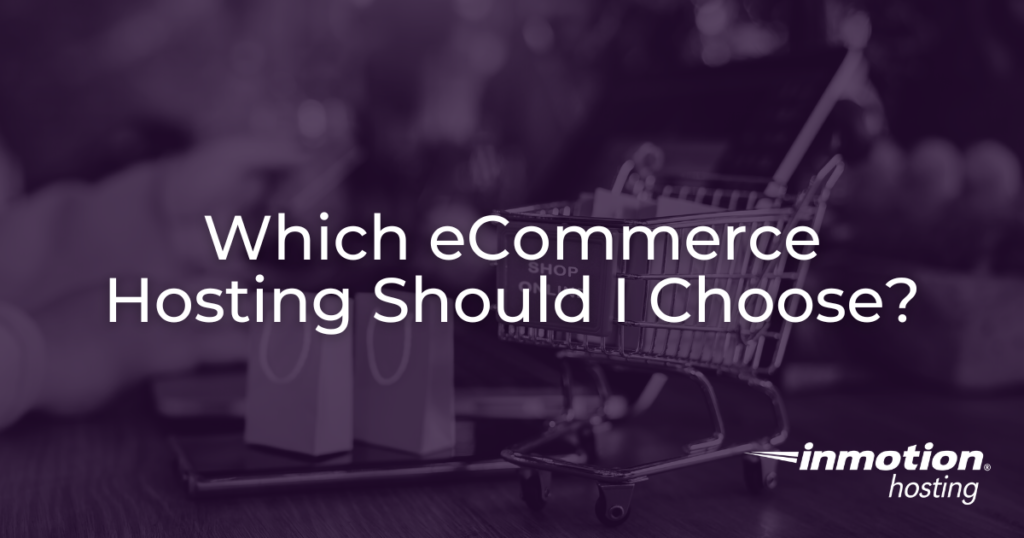
Finding the right eCommerce Hosting for your website can be intimidating no matter the size of your business. Now, more than ever, it’s imperative that your organization has a strong eCommerce presence due to its highly competitive environment.
In this article we will discuss the different eCommerce hosting solutions users have, and how to find the most beneficial one for your company.
- What is eCommerce Hosting?
- Types of eCommerce Software
- What should I look for in an eCommerce Host?
- Web Hosting
- Website Builders
- Enterprise Level eCommerce
- Final Thoughts
As eCommerce hosting goes deeper than just generating sales, it’s important to remember that all businesses are different, so be sure to keep your specific needs in mind when reviewing the options below.
What is eCommerce Hosting?
eCommerce hosting is a specific form of web hosting that specializes in “electronic” commerce websites. As online shops’ needs differ from other website types, such as blogs or marketing sites, hosting plans may vary depending on the host.
In essence, eCommerce hosting acts as the digital foundation for businesses to showcase and sell their products or services on the internet, ensuring a reliable platform for online commerce.
eCommerce Software Quick Comparison
Note: Please be advised that the information presented below pertains exclusively to the programs themselves, distinct from our hosting plans, and originates from their respective parent companies.
| Solution* | Hosting Type | Price | Licensing | Drag-and-Drop Builder | Business Size | Website Migration |
|---|---|---|---|---|---|---|
| WooCommerce | Shared + | Free | Open Source | Yes | Small + | Yes |
| Magento | VPS + | Free | Open Source** | Yes | Medium + | Yes |
| PrestaShop | Shared + | Free | Open Source | No | Small + | Yes |
| OpenCart | Shared + | Free | Open Source | No | Small + | Yes |
| Shopify | N/A | $39+/mo | Proprietary | Yes | Small+ | No |
| Squarespace | N/A | $23+/mo | Proprietary | Yes | Small | No |
| Wix | N/A | $16+/mo | Proprietary | Yes | Small | No |
| BigCommerce | N/A | Quote Needed | Proprietary | Yes | Large | No |
**Magento Commerce License available at a premium.
Types of eCommerce Software
With so many options available, the eCommerce industry and its market share change day by day. As a whole, it is projected that in 2024 the eCommerce software market will reach a revenue of $8.14 Billion USD [1].
Per Statista, WooCommerce and Woo Themes brought in the most revenue and therefore dominated the Market Share for eCommerce hosting [2]. However in the last couple of years, there has been a large rise of websites built with Shopify according to Built With [3].
As the market is expected to continue growing for the next few years, with an expected CAGR of 4.26% by 2028 (a projected market volume of $9.62 Billion USD), business owners should keep an eye out for possible changs still to come.
What should I look for in an eCommerce Host?
Consider the following list when looking at your eCommerce hosting options:
- Resources: Bandwidth, RAM, CPU Cores, and Scalability are some of the most important aspects of any web hosting plan.
- Business Size: The amount of products offered by your company, expected user traffic, and account creations may all affect the tools and resources you need.
- Budget: All server levels, including Website Builders, will have a wide range of price options, oftentimes these are introductory rates, so be mindful of the final cost of your hosting plan.
- Technical Complexity: Do you need specialized software on your server for the products you sell? Would you prefer to have a web designer code your website from scratch? Certain hosts or plans may not have these sorts of features available for you, so ensure you take note of your technical requirements.
- Security: Your client’s data is the most important aspect of your eCommerce journey, be sure that the hosting company you choose offers extensive security measures such as malware and hack scanning or protection.
- Technical Support: Responsive customer support, clear Service Level Agreements (SLAs), and a cost structure will depend on your hosting provider.
Open Source vs Proprietary Software
The distinction between open source and proprietary software lies in their source code accessibility and distribution. Open source software provides users with access to its source code, allowing them to view, modify, and distribute it freely.
In contrast, proprietary software’s source code is typically restricted, proprietary, and owned by the software’s creator or distributor. Users are granted a license to use the software under certain conditions, but they do not have access to the underlying code, limiting customization and redistribution.
As mentioned above, proprietary software cannot be distributed, meaning that certain software will not be able to be transferred over if you decide to change hosting companies in the future.
Web Hosting vs Website Builders
Whether you are looking for eCommerce, or general web hosting solutions, you’ll oftentimes come across hosting companies (such as Wix or Squarespace) define themselves as website builders.
Generally, drag-and-drop website builders will be proprietary software that advertise themselves as user-friendly alternatives to traditional hosting control panels. Features and customization options are oftentimes tied to their tiered plans, but may have other tools for users such as website analytics and payment gateways option available.
| Hosting Style | Traditional Web Hosting | Website Builders |
|---|---|---|
| Server Options | Shared, Reseller, VPS, Dedicated, Cloud | Cloud Servers |
| SSH / Root Access | Yes* | No |
| Software and CMS Installations Available | Yes | No |
| Website Migration | Yes | No |
| Server Settings and Resource Customization | Yes** | No |
**Usually available on VPS Plans and above.
The final decision should align with your individual or business’s goals, technical expertise, and the desired level of control over your online presence
Enterprise vs Small Business Solutions
When considering your future eCommerce hosting plan the size of your business should be one of your top priorities. Price, resource scalability, and technical complexity, will be affected depending on the plan you choose.
- Small Businesses: Scalability within budget constraints, reliable performance, basic security features, and user-friendly interfaces are crucial considerations. Shared or managed hosting are usually a great place to start for small businesses.
- Enterprises: Large organizations demand advanced scalability, high-performance infrastructure, robust security protocols, and fine-grained customization options.These organizations will oftentimes have dedicated developers that handle a large portion of their website management. VPS or Dedicated servers are needed to meet the needs of enterprises.
Now that you know what to look for, let’s review some of the most popular eCommerce solutions in the market today.
Web Hosting
Below are some of the top eCommerce platforms supported by most traditional web hosting companies.
The majority of these options will be free and open source; however keep in mind that some features and extensions may come at a premium depending on the platform you choose. Hosting plan prices are also not factored in as these may fluctuate depending on the company you host your website with.
Woo (WooCommerce)
Price: Free WordPress Plugin, with the option to buy extensions.
WooCommerce is a WordPress plugin that transforms a WordPress website into a fully functional eCommerce store, enabling users to sell products or services online with customizable features and seamless integration.
Improve the performance and security of your WooCommerce site with our new WooCommerce Hosting plans. Get 40x faster speeds for your online store with dedicated resources, server caching, and optimization tools.
High-Performance VPS
99.99% Uptime
Free SSL & Dedicated IP
Advanced Server Caching
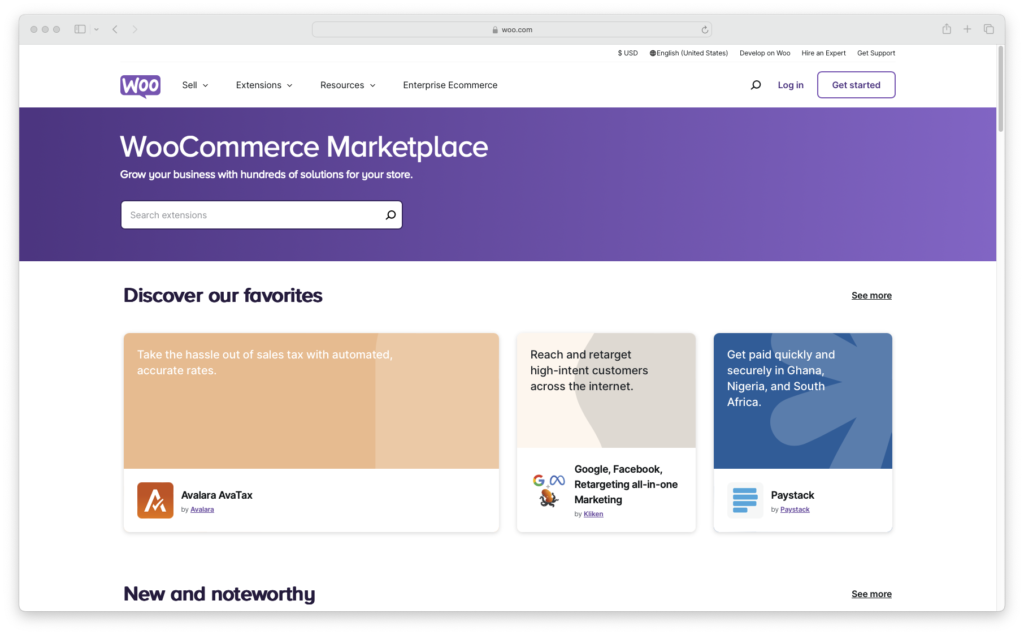
For extensions and related themes, Woo offers its Marketplace for users to easily find and pay for any needed features. This marketplace can also be accessed directly from the WordPress dashboard.
Learn more about WooCommerce Hosting.
Magento Open Source
Price: Free, with the option to buy extensions.Adobe acquired Magento in 2018 and was then renamed to Magento Open Source (more on the enterprise version below). It offers a free, easy to use dashboard and a great customizable framework for users new and old to the software.
As an open source solution it provides users the ability to modify, extend, and enhance the platform according to their requirements. Adobe also allows users to create their own extensions and tools, encouraging their distribution through their extensions marketplace.
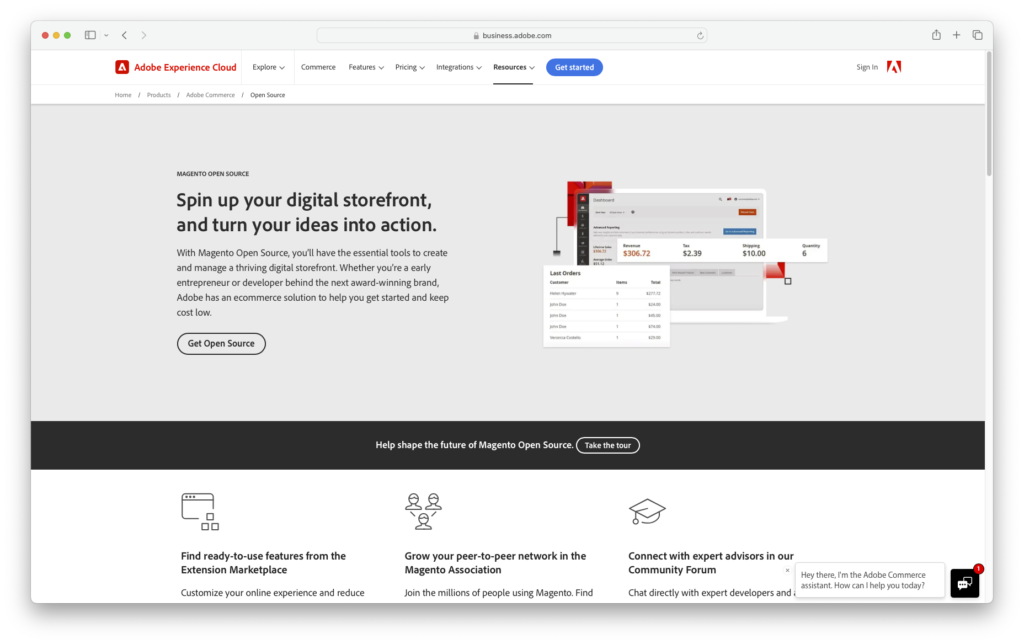
Magento Open Source includes features such as advanced product management, secure payment options, and a robust community of developers contributing to its ongoing improvement.
Learn more about Magento Hosting.
PrestaShop
Price: Free, with the option to buy extensions.
PrestaShop provides a range of features for product listing, secure transactions, and overall eCommerce functionality. It includes a user-friendly interface, various themes, and a modular architecture, enabling users to adapt and expand their online stores according to their specific needs.
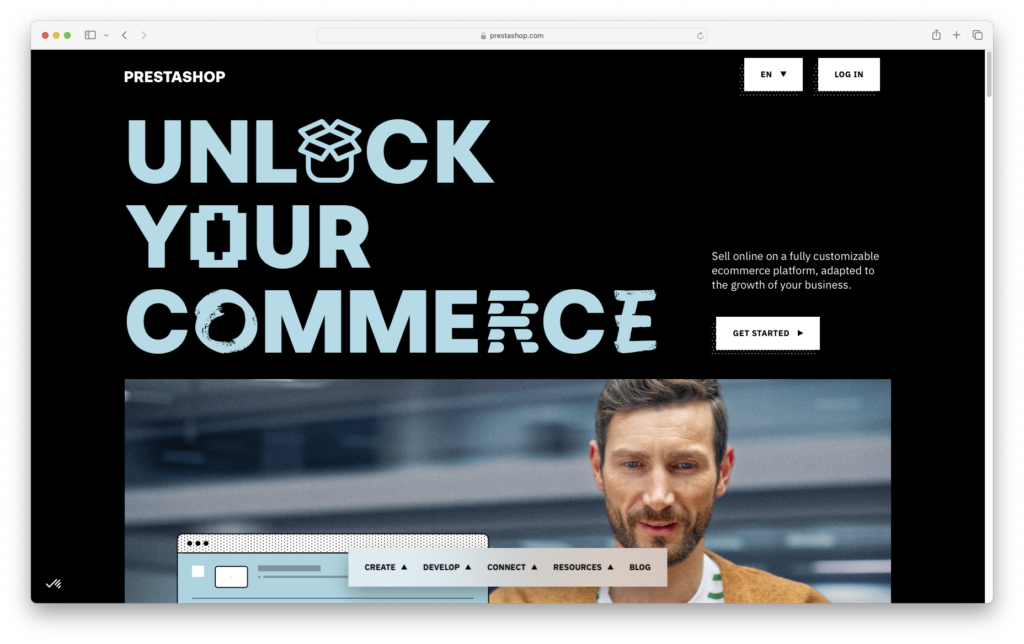
PrestaShop, established in 2007, has undergone numerous changes and updates over the years. It provides users with a diverse array of tools, themes, and extensions to enhance their online store experience.
With a community of developers contributing to its evolution, PrestaShop is a popular choice for businesses seeking a cost-effective and flexible eCommerce solution.
Learn more about PrestaShop Hosting.
OpenCart
Price: Free, with the option to buy extensions.
First released in 1999, OpenCart is one of the longest standing dedicated eCommerce platforms available to users.
Because of its age, OpenCart has a more robust design and form of operations compared to the other options on this list. It does not have drag-and-drop capabilities, but it is easy to learn and has a large community of passionate developers behind it.
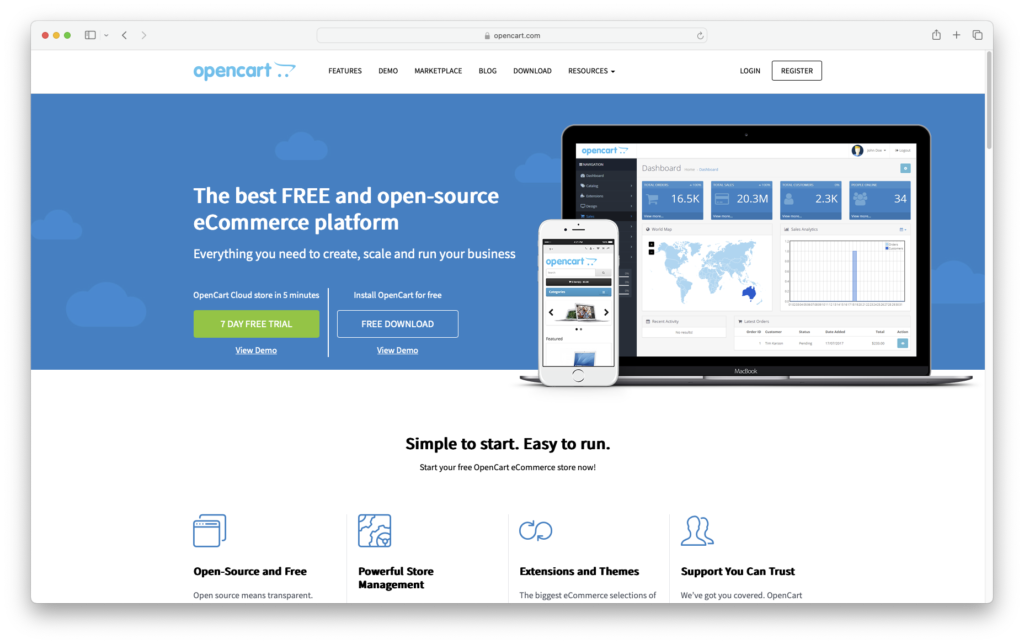
Developed in PHP, OpenCart provides a user-friendly interface, a range of customizable templates, and various extensions to add functionalities. OpenCart remains a powerful eCommerce platform that should not be overlooked, especially for those not interested in block builders.
Learn more about OpenCart Hosting.
Website Builders
Website builders offer an easy-to-learn interface for users not familiar with web hosting and coding. These companies usually do not offer different server options, rather they will provide cloud hosting to their clients who can scale their store depending on their size.
Note: All companies under this section are proprietary software and your shop and products cannot be migrated to a different host if you decide to change providers in the future.
Shopify
Price: Starts at $39+/mo or $39+/yr
As previously mentioned, Shopify has expanded as a company since its inception in 2006. It is a dedicated website builder with tools and settings created for sellers, which sets it apart from other drag-and-drop builders such as Wix and Squarespace.

Due to its emphasis on eCommerce, this platform comes with a higher cost compared to its competitors, which could pose a challenge for smaller businesses working with limited budgets.
Shopify offers a user-friendly interface, a variety of customizable templates, and a range of features such as product management, secure transactions, a dedicated App, and inventory tracking.
It’s crucial to note, like with any proprietary software, that you might be restricted from moving your website away from Shopify due to licensing. This can potentially lock customers into facing increases in plan or add-on prices.
Squarespace
Price: Starts at $23+/mo or $192+/yr
Squarespace is an all-in-one website building and hosting platform that provides users with a variety of tools to get their websites online as fast as possible.
While Squarespace is not a dedicated eCommerce website builder such as Shopify, it does have eCommerce capabilities such as payment gateways, product cataloging, and shipping options.

Squarespace provides users with website analytics and creator tools to further enrich their customer’s experience, as well as a number of templates and block sections.
Wix
Price: Starts at $23+/mo or $192+/yr
Similar to Squarespace, Wix is a drag-and-drop website builder that can be converted into an eCommerce solution.

The company has a variety of templates and plugins available for users via their app marketplace, but (unlike Adobe’s Magento Open Source) there’s no way to create your own via code.
Items in the Wix marketplace range in prices, not included in your hosting plan, however all are designed to integrate into their platform seamlessly.
Enterprise Level eCommerce
Enterprise eCommerce hosting is designed to meet the rigorous demands of large-scale online businesses.
Built for scalability, these hosting plans can handle significant increases in traffic and data volume, ensuring optimal performance and a seamless user experience.
Additionally, customization options, advanced support, integrated solutions, and a global reach make enterprise hosting suitable for businesses with complex requirements and a need for an efficient and reliable hosting environment.
Adobe Commerce [Paid]
Price: Quote Needed
Adobe Commerce is the enterprise-level eCommerce solution that evolved from Magento, offering a wealth of advanced features and services.
These include cloud hosting, advanced analytics, and a suite of enterprise-level tools designed specifically for large-scale businesses.

This platform delivers a comprehensive and customized solution, emphasizing scalability, security, and extensive customization options to meet the unique needs of businesses operating at a grand scale.
Adobe Commerce also has the opportunity to be installed in any server as long as a license is purchased, this means that you are not locked in to only using Adobe Cloud for your business.
BigCommerce
Price: Quote Needed
BigCommerce is a Software as a Service (SaaS) eCommerce solution targeted towards large corporations. Because of this all of their plans require a quote from their sales team.

Established in 2009, BigCommerce provides a user-friendly interface, customizable templates, and a variety of eCommerce features. These include secure transactions, inventory management, and marketing tools with analytics capabilities.
BigCommerce is also a proprietary software company, meaning certain aspects and features are not accessible to users. One of the key features is Root Access for developers of large corporations, as all users share a root folder via cloud hosting.
Note: If your large organization is seeking robust eCommerce hosting, we advise you to discuss your options with your developer. They can guide you on features necessary for compliance and ensuring optimal performance tailored to your business needs.
Final Thoughts
We have delved into three prominent categories of eCommerce hosting: traditional web hosts, drag-and-drop website builders, and enterprise-level solutions.
Each option offers distinct advantages catering to different user preferences and business needs.
Traditional web hosts provide unparalleled customization and control, drag-and-drop builders offer simplicity and quick deployment, while enterprise solutions excel in scalability and performance.
Still unsure on what’s the best option for your company? Feel free to reach out to our web hosting experts – we’re here to help!
